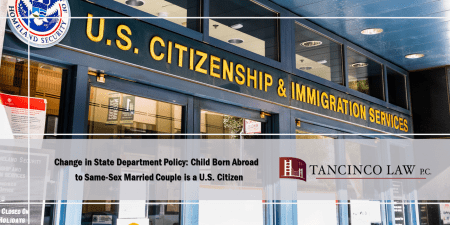In a recent development relating to transmission of U.S. citizenship to children born abroad to same sex couples, the U.S. Department of State said that it will recognize birthright citizenship for children born abroad to married parents, as long as one parent is an American citizen. This is a policy change that makes it easier for same-sex couples to pass citizenship on to their children born overseas.
This change in policy was prompted by a series of federal court cases where the court sided with same-sex couples, many of whom married and started families abroad before the U.S. legalized same-sex marriage.
One of the cases filed was that of Laura Fieldne. Laura, a U.S. citizen, is married to her wife, Maria, a Spanish citizen. Maria gave birth to their older daughter, L.F., in Spain with the help of an anonymous sperm donor. Laura, being a U.S. citizen, reported the birth of LF abroad as a U.S. citizen but the registration was denied, stating that the qualifying US citizen parent does not have a biological relationship with the child. In 2020, Laura filed a federal lawsuit against the U.S. Department of State policy as being discriminatory and unconstitutional.
Under the Immigration and Nationality Act, while married couples can give birthright citizenship to their children born abroad if either parent is eligible to do so, children born “out of wedlock” must be biologically related to the eligible citizen parent. The State Department’s policy before was to treat babies born through assisted reproductive technology to same-sex couples as out of wedlock. This policy is certainly unconstitutional disregarding the dignity and equality of the marriages of same-sex couples. How can both same sex couples be blood-related to the child?
The change in policy is a welcome development to the immigrant and LGBTQ community. State Department spokesperson Ned Price said in a press statement that children born abroad to married parents can now have birthright citizenship if they have a genetic or gestational tie to at least one of their parents and if at least one of their parents is an American citizen.
“This updated interpretation and application of the [Immigration and Nationality Act] takes into account the realities of modern families and advances in [assisted reproductive technology] from when the Act was enacted in 1952,” Price said.


